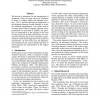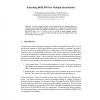1235 search results - page 123 / 247 » Structured Meanings in Computational Linguistics |
COLING
2002
14 years 9 months ago
2002
We describe a mechanism for the interpretation of arguments, which can cope with noisy conditions in terms of wording, beliefs and argument structure. This is achieved through the...
BIRTHDAY
2009
Springer
15 years 4 months ago
2009
Springer
Abstract. We investigate combinatorial commutation properties for reordering a sequence of two kinds of steps, and for separating wellfoundedness of unions of relations. To that en...
GI
2004
Springer
15 years 3 months ago
2004
Springer
: A means to define multiple activity instantiation is an important feature of a business process modelling language. In this paper we suggest to extend BPEL4WS with structured ac...
FROCOS
2005
Springer
15 years 3 months ago
2005
Springer
Abstract. In this paper, we introduce a spatial and temporal logic for reasoning about distributed computation. The logic is a combination of an extension of hybrid logic, that all...
FLAIRS
2001
14 years 11 months ago
2001
A maximal prime subgraph decomposition junction tree (MPD-JT) is a useful computational structure that facilitates lazy propagation in Bayesian networks (BNs). A graphical method ...


